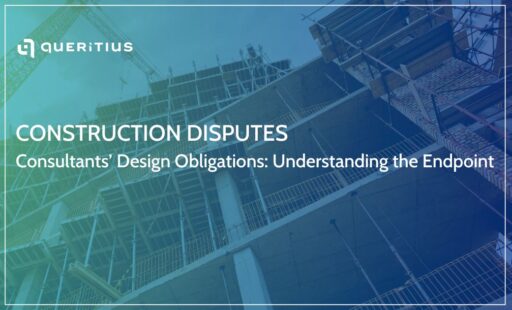Consultants’ Design Obligations: Understanding the Endpoint

14. 06. 2024
In Lendlease Construction (Europe) Limited v Aecom Limited [2023] EWHC 2620 (TCC), the English Technology and Construction Court (TCC) examined the nature and extent of a Consultant’s obligations to a Main Contractor under a contract to provide mechanical and electrical consultancy services.
Lendlease, who was appointed as the Main Contractor under a design and build contract for the construction of a new Oncology Centre at St. James’ University Hospital in Leeds (D&B Contract), engaged Aecom to provide mechanical and electrical engineering consultancy services under a Consultancy Agreement.
In 2019, a dispute arose concerning the Consultant’s obligations under the Consultancy Agreement. The Main Contractor argued that the Consultant was responsible for the design of the mechanical and electrical services and the lead consultant responsible for the Fire Safety Strategy and the design thereof, thus suggesting that it had sub-contracted to the Consultant its obligations to the Employer under the D&B Contract in respect of MEP services and fire safety design. The Consultant, on the other hand, argued that its obligations under the Consultancy Agreement were more limited and not an exact replication of the Main Contractor’s obligations to the Employer.
The starting point of the TCC’s analysis was the Consultancy Agreement, particularly Clauses 1.01 and 4.01, which provide as follows:
“1.01 The Consultant shall be deemed to have notice of and shall observe the Employer’s Requirements and/or the Project Agreement and/or the Principal Agreement to the extent the same shall have been issued to the Consultant by the Contractor and to that extent shall be deemed to have full knowledge of the terms and conditions of the Employer’s Requirements and/or the Project Agreement and/or the Principal Agreement. To the extent of the obligations of the Consultant as set out in this Agreement, the Consultant shall ensure that no act, default or omission of the Consultant shall cause or contribute to any breach by the Contractor of any of its obligations contained in the Employer’s Requirements and/or the Project Agreement and/or the Principal Agreement.”
“4.01 The Consultant warrants that he has exercised and will exercise all reasonable skill care and diligence in conformity with the normal professional standards of a consultant holding himself out as a competent consultant experienced in the provision of such services for projects similar in scope and complexity to the Works and having regard for the dates and periods stated in the Contract Programme and Design Service Programme and duties herein described and will comply in all respects with the requirements of the local authority, statutes, regulations, and codes of practice in force and relevant to the design of the Works, including but not limited to fire, health and safety. Notwithstanding any other clause in this Agreement or the Principal Agreement or term implied by statute or common law, the Consultant shall not be construed to owing any greater duty in relation to this Agreement than the use of necessary reasonable skill, care and diligence pursuant to this Clause 4.01.”
Consultants not required to achieve the Main Contractors’ upstream obligations.
The Main Contractor argued that Clauses 1.01 and 4.01 collectively imposed a duty on the Consultant to achieve the specific standards outlined in the Main Contractor’s Project Agreement with the Employer, effectively transferring the Main Contractor’s obligations to the Consultant. The TCC rejected the Main Contractor’s argument, emphasising that the clauses must be read in the context of the entire agreement. The final sentence of Clause 4.01, which limits the Consultant’s duty to exercising reasonable skill and care, applied to all of the Consultant’s obligations, including those in Clause 1.01. Consequently, the Consultant was not required to achieve specific outcomes but rather to perform its services with reasonable skill and care. The Consultancy Agreement did not transfer down the line the Main Contractor’s obligations to the Consultant. While the Consultant had to be aware of and consider the Employer’s Requirements and Project Agreement, it was not obliged to guarantee compliance with these standards. As such, a failure to meet regulatory standards would only constitute a lack of reasonable skill and care if no compelling explanation was provided.
No continuing duty to review unless the contractual obligations expressly say so.
The Main Contractor further argued that the Consultant had a continuing duty to review its designs and provide advice or warnings about non-compliance issues to Lendlease after the initial design phase. The court held that a designer’s obligation is typically limited to providing the design unless the contract expressly includes ongoing duties. There can be a continuing duty to review designs up to the point of their incorporation into construction if the contractual obligations extend beyond the initial design provision. In this case, the Consultant’s duty to review was limited to instances where a reasonably competent professional would find it necessary to conduct a review, prompted by specific reasons or requests.
This case underscores the critical importance of explicitly defining the scope of design obligations. To avoid disputes, consultants and contractors with design responsibilities should seek to ensure that their contracts / appointment agreements clearly outline each party’s responsibilities strictly limiting their liability for design to using reasonable skill and care.
Stay tuned for the next instalment of this Construction Disputes series.
